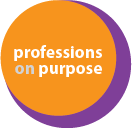Professions on Purpose’s podcast (or “PoPcast”) focuses on these themes:
- Developing or transitioning to more fulfilling work through…
- Cultivating self knowledge, especially from—and through—one’s work
- Discerning/listening and ultimately responding to callings by…
- Using one’s combined talents, values, mindsets …, the true meaning of “profession”
We do this via conversations
Professions (as research) on Purpose:
What do particular professions, as typically defined (e.g. anthropology, banking, carpentry, etc.) have to tell us about pursuing purpose in our work and lives?
A subset of this are deep-dive “On the Purpose of ____” conversations that cover a myriad of topics, such as the role of ambiguity, failure, entrepreneurship, suffering… in fulfilling work.
Professions (as “me-search”) on Purpose:
Guests discuss how through their own career paths, have guests learned about themselves and how have they responded to callings by crafting a profession: a commitment that integrates that self-knowledge: their natural gifts and talents, values, and ways of being: how they approach people and situations, process information, and see the world.
Guest Guidelines:
Our conversations are more about the producer than the product; the servant, not the service.
We focus on not so much what they do, but why they do it and how it helped them understand who they are.
We’re interested in research that begins with “me-search”.
Of course, we do want takeaways for the audience. And it’s our responsibility to distill those, not the guest’s. Though we do hope that guests help us.
PoPCast’s Values
Be useful, usable, and used. “Interesting”, “inspiring” or learning isn’t enough. PoPCast conversations aim to put theory to work for its listeners, so they can invite more purpose into their lives.
Make things as simple as possible, but not simpler. Along with actionable, we aim to be accessible to a broad, general audience. This entails synthesizing and translating ideas across disciplines. But we’re also frank about the difficulties–and limits–of doing so.
Deep diversity: Different narratives that can reach and connect to the roots of our shared humanity are sought. This includes the neurodiverse, diversity of professions, experiences, worldviews …
Conversation > interview. This (and all the above) is mostly the host’s responsibility. He will do the reading, reflection, preparation and other homework necessary so each episode has a purpose. Tell him how he can help you help him do this.
A Politics-Free Zone
It may seem odd for a program based in quintessentially political Washington DC to eschew such discussion. We’re trying to keep politics out of the PoPcast–and we ask your help with that. There are some things, some weaknesses that I (Stefan) have seen in our culture (#1 & #2) and myself (#3 & #4).
- There’s no lack of political content; people need a respite from it. Adding more entails a high opportunity cost, as economists call it; there are so many (more) important topics not being adequately discussed.
- People are so polarized today, that if they deduce a guest is of an opposing political tribe, they will often ignore or discount the message. Some even do that with the advice of accountants, doctors….*)
- I find politics tedious. I was once engaged: I grew up near DC and worked on some political campaigns in my teens, but grew out of it by the time I could vote. (Yup. This is my version of it’s my ball and I’m taking it home.)
- One thing I still haven’t grow out of was years of debate in high school and college. So, I’m still triggered by logical fallacies, sloppy thinking and other sub-par argumentation. Of course, arguing about arguing gets us off track quickly, digresses and would kill an episode.
Your efforts to keep political discussion to a minimum are appreciated
[*OK. Maybe I misread that somewhere]
